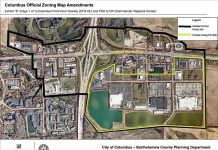Shot down once already, a Bartholomew County Council member will take one final stab next week at implementing a new tax to improve the county’s financial position.
When council member Mark Gorbett suggested implementing a local option income tax Sept. 8, it ran into strong resistance from four of the seven council members who have maintained an anti-tax stand during the county’s budget-preparation cycle.
In fact, the debate got so intense that Gorbett’s motion was never brought up for a vote during that meeting, with Evelyn Pence, Laura DeDomenic, Jorge Morales and Bill Lentz all opposed to implementing that or any other new tax.
And with the 2016 county budget process about to conclude, there’s no indication of a dramatic shift in philosophies among the majority anti-tax faction of the council.
“I know when we’ve discussed this. It’s come to blows back and forth,” Gorbett said during Monday’s county council work session.
Known as the “public safety tax,” the local option income tax was created in Indiana primarily to increase spending for police and fire coverage. However, passage of such a tax can then redirect money already planned for public-safety protection to serve other needs.
While acknowledging the likely redirection of some funds, Gorbett — who completed two terms as sheriff in 2014 — said he is concerned about providing his successor, Matt Myers, with the financial resources the department requires.
Already levied by 19 of Indiana’s 92 counties, the local option income tax would raise the total county tax by .25 percentage point, chief deputy auditor Sandy Beatty said. Enactment would cost a Bartholomew County resident making $35,000 a year about $1.68 every week.
While the tax would generate more than $5 million, the county would receive about $2 million of the tax proceeds, Beatty said. The rest would go to incorporated communities including Columbus, which would receive the largest share of the revenue, she said.
Gorbett’s proposal will be made the same evening the council is scheduled to vote on final adoption of the $17.185 million general fund budget for next year, Beatty said.
“That amount means we can support the same expenses in 2016 that we’ve had this year,” Beatty said. “But it doesn’t allow for extra expenses or anything on top of that.”
“We’ve made some reductions, but a lot of it was from just shuffling money and paying out of another fund,” Bartholomew County Auditor Barb Hackman told the council.
Some pots of money used to reduce an anticipated 2016 county budget deficit will not be available a year from now when the council sets the 2017 budget, Hackman said.
That includes $1.4 million from economic development income tax funds the commissioners agreed to return to the general fund for next year, as well as $108,000 from a telecommunications fund, she said.
Commissioners will have to spend more in 2017 for road repairs than what was allocated for next year, councilman Chris Ogle said.
In recent budget discussions, Ogle and councilman Jim Reed joined with Gorbett in considering new revenue streams for the county.
Due mostly to health insurance, Gorbett noted that county employees are already getting 68 percent more taken out of their paycheck this year compared with 2014.
While county employees may be asked to give up even more of their take-home pay a year from now, there won’t be any funds to increase their salaries for the next two years without a tax increase, he said.
Gorbett said it is inevitable that the county will have to consider more new taxes in the future, such as Local Option Highway Vehicle and Cumulative Capital Development taxes.
The four council members who strongly spoke out against a new tax last month were silent during Monday’s discussion.
But after the meeting, Lentz — who said funds created by a new tax would end up being spent in six months — simply showed a yellow note pad on which he had written three words: “No new taxes.”
However, Lentz did say he might be open to the idea of enacting a Local Option Highway Vehicle tax — also known as a wheel tax — sometime next year.
“Since it’s a user fee, it isn’t as painful as seeing more money taken out of your paychecks,” he said.
It consists of an excise surtax on passenger vehicles ranging from $7.50 to $25. A wheel tax on larger commercial vehicles could run from $5 to $40.
If enacted, the vehicle tax would be expected to generate about $1.5 million in Bartholomew County to be used for road improvements. Like the local option income tax, funds from the wheel tax would be distributed to all incorporated communities.
[sc:pullout-title pullout-title=”Local option income tax” ][sc:pullout-text-begin]
Type: Income tax already levied by 19 of Indiana’s 92 counties
Cost: Based on income. For employee making $35,000 a year, the cost would be $1.68 every week.
Stated purpose: Public safety
Amount raised if enacted (based on 2015 data): Columbus, $2.84 million; Bartholomew County, $2.06 million; Edinburgh, $118,000; Hope, $29,000; Hartsville, $2,184; Clifford, $1,203; Elizabethtown, $471. Jonesville also would receive an amount appropriate for its population.
[sc:pullout-text-end][sc:pullout-title pullout-title=”What’s next” ][sc:pullout-text-begin]
The Bartholomew County Council will meet at 6 p.m. Tuesday in the council chambers on the fourth floor of the Government Office Building, 440 Third St. The council is expected to consider final approval of a $17.185 million general fund budget during the meeting.
[sc:pullout-text-end]




